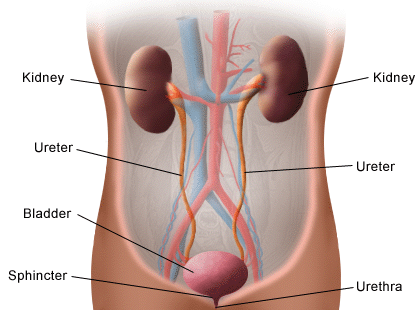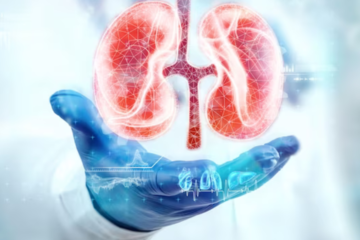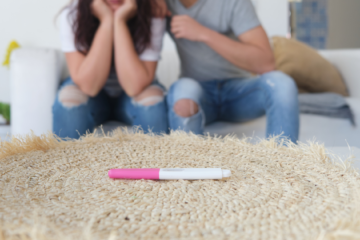Urine Frequency and Urgency
First of all let us understand the human urinary tract. Urinary tract starts with kidney, the pipe of kidney (Ureter) that carries the urine formed in kidneys to the reservoir, the urinary bladder. The kidneys are bean shaped organs located in upper part of the back by the side of the backbone. The function of kidney is to filter the body waste and excess water from the blood and remove it in the form of urine.

The kidneys function 24X7, and produce urine throughout the day. Therefore, god created a reservoir in the path of urine in lower part of the abdomen called the urinary bladder. The function of the urine bladder is to store urine silently at low pressure. It is distensible like a balloon and can store up to 500ml of urine. Till this point it remains calm and cause mild/no sensation of bladder fullness in form of urge to pass urine. Once the urine volume stored in bladder exceeds this volume, it starts sending signal to brain indicating the brain that it needs to be emptied. Now the brain sends the signal to all the senses to find a socially acceptable place to empty the bladder. Bladder upto this point remains calm. Once the individual reaches a lavatory, removes the clothes and assumes a posture favourable to pass urine, the brain send signal to bladder to contract. At same time of contraction of bladder, the outlet of bladder that had remained closed till this point preventing leakage of urine opens up and urine starts coming out. The bladder keeps on squeezing the urine out till it empties completely. After complete emptying it relaxes, stops sending signal to brain and the outlet closes. This cycle is repeated multiple times in a day.
If a person passes urine too frequently it can be because of three reasons:
- Excessive amount of urine is being formed. It happens if:
- .
- Excessive amount of water is being consumed
- High blood sugar
- Swelling of feet. If someone who has swelling of feet which generally is due to excessive accumulation of water in feet, lies down, all the excess water, which was held in feet by virtue of gravity, goes into blood. The kidneys filter this excessive water and more urine is formed
- .
- The storage capacity of bladder has reduced. This can happen if the bladder gets infected and heals by formation of fibrous tissue. The fibrous tissue has less elasticity and can’t distend to same extent as normal tissue does. The pressure in bladder increases at small storage volumes and it start sending signal to brain and the individual passes urine more frequently.
- The bladder is overactive. This urinary bladder is like a cry baby. It starts signal to brain at lesser storage volume and doesn’t wait for the command to come from the brain to contract. It starts contracting on its own producing a sensation called urgency. This is a sudden irresistible urge to pass urine. Sometime the pressure in the bladder exceeds the pressure of the muscle (called the sphincter) that closes the outlet. The urine at this point starts leaking (Urge urine incontinence).
- Sometimes the bladder is oversensitive. Bladder is the favourite and most spoiled baby of the brain. It gives the bladder undue importance and the bladder also behaves like an attention seeking child. Even at small volumes of filling in certain individuals, it keeps sending false alarms to brain. However, brain gives undue importance to these signals and the individual keeps on passing urine frequently, despite the fact that the urge was no too strong, bladder was not full and bladder was not contracting. Here the individual has to understand the situation and tell the brain that if I have passed urine 10 min ago, even if the bladder is sending signals it can’t be full. So, the brain has to learn to ignore this signal. There are so many signals we ignore in day to day life like the touch of clothes to the skin. It just requires some training. The best way to treat the attention seeking baby is ignore. If the behaviour doesn’t produce the intended response, it will stop. It can be done by diverting the mind off the bladder and passing urine at timed intervals. The gap between voiding episodes can be increased gradually. So start by going to pass urine not earlier than 45 min (it’s not obligatory to go after 45 min if there is no sensation. However, prior to this is preferably avoided.) On weekly bases increase timing by 15 minutes till you reach and acceptable frequency of voiding.
Depending upon what is the underlying reason because of which there is increased urine frequency, treatment can be tailored. General guidelines are:
- Avoid drinking excessive water. Two litres in summer and 1.5 litres in winters should suffice. This includes all fluids like milk, tea, coffee.
- Check your blood sugars and control it well if you are diabetic.
- If there is swelling of legs, while sitting in day time keeps the legs on a chair or stool so that there is no pooling of water due to gravity.
- If the bladder storage capacity has reduced it can be increased surgically.
- If the bladder is overactive, it can be calmed down by medications called bladder sedatives.
- If oral medications don’t produce acceptable benefit, some medications can be injected into the wall of urine bladder to calm it down. Of course all treatment modalities require active participation of the individual and retraining of the mind/ Behaviour.
If you are happy with your visit and are getting better please write a review:
You can google drsumiturologist or Deetyaclinic: there will be a business page towards right side. Please write a review and help us grow.



